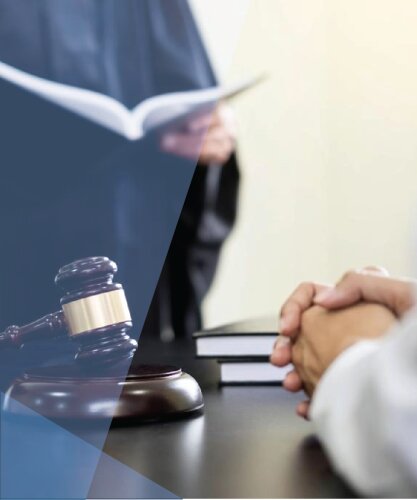Best Admiralty & Maritime Lawyers in Qatar
Share your needs with us, get contacted by law firms.
Free. Takes 2 min.
Or refine your search by selecting a city:
List of the best lawyers in Qatar
About Admiralty & Maritime Law in Qatar:
Admiralty and Maritime Law in Qatar is a specialized area of law that governs navigable waters, including oceans, seas, rivers, and canals. This legal framework deals with various issues such as shipping, navigation, marine pollution, salvage, and marine accidents. Qatar, being a coastal state, has its own set of laws and regulations that regulate activities related to maritime commerce and transportation.
Why You May Need a Lawyer:
You may need a lawyer specializing in Admiralty & Maritime Law in Qatar if you are involved in maritime disputes, need assistance with vessel registration, face liability claims for maritime accidents, or require guidance on compliance with maritime regulations. Legal issues in this field can be complex, and a lawyer with expertise in Admiralty & Maritime Law can provide valuable advice and representation.
Local Laws Overview:
Key aspects of local laws in Qatar related to Admiralty & Maritime include the Maritime Code, which regulates maritime activities, including vessel registration, crew matters, and maritime claims. Qatar also follows international conventions and agreements related to maritime safety, pollution prevention, and liability in the maritime industry. It is important to be aware of these laws to ensure compliance and resolve legal issues effectively.
Frequently Asked Questions:
Q1: How can I register a vessel in Qatar?
In Qatar, vessel registration is overseen by the Ministry of Transport and Communications. You will need to submit the necessary documentation and meet the requirements outlined in the Maritime Code to register your vessel legally.
Q2: What should I do if I am injured on a ship in Qatari waters?
If you are injured on a ship in Qatari waters, you may be entitled to compensation under maritime law. It is advisable to seek legal advice from a lawyer specializing in Admiralty & Maritime Law to understand your rights and options.
Q3: How is liability determined in maritime accidents in Qatar?
Liability in maritime accidents in Qatar is determined based on various factors, including the circumstances of the accident, negligence, and applicable laws. A lawyer with experience in Admiralty & Maritime Law can help assess liability and represent your interests in such cases.
Q4: Are there specific regulations for maritime pollution in Qatar?
Yes, Qatar has regulations in place to prevent and control maritime pollution. These regulations outline requirements for reporting incidents, handling hazardous materials, and minimizing environmental impact. Compliance with these regulations is essential to avoid legal consequences.
Q5: Can I resolve maritime disputes through arbitration in Qatar?
Yes, maritime disputes can be resolved through arbitration in Qatar. Arbitration is a common method for settling disputes in the maritime industry, providing a neutral and efficient alternative to litigation. A lawyer with experience in maritime arbitration can assist in navigating this process.
Q6: What is the role of the Qatar Maritime Law Committee?
The Qatar Maritime Law Committee is a governmental body responsible for advising on legislative matters related to Admiralty & Maritime Law in Qatar. The committee plays a key role in developing and implementing laws and regulations to ensure the effective governance of maritime activities in the country.
Q7: Can foreign vessels operate in Qatari waters?
Foreign vessels can operate in Qatari waters, but they must comply with the laws and regulations of Qatar, including registration requirements, safety standards, and environmental regulations. It is important for foreign vessel operators to understand and adhere to these requirements to avoid legal issues.
Q8: What are the penalties for non-compliance with maritime regulations in Qatar?
Penalties for non-compliance with maritime regulations in Qatar can vary depending on the severity of the violation. These may include fines, vessel detention, license suspension, and other administrative sanctions. It is essential to adhere to regulations and seek legal advice if facing compliance issues.
Q9: How can I verify the qualifications of a maritime lawyer in Qatar?
You can verify the qualifications of a maritime lawyer in Qatar by checking their credentials, experience, and reputation in the field. Look for lawyers who are licensed to practice law in Qatar, specialize in Admiralty & Maritime Law, and have a track record of handling maritime cases effectively.
Q10: Are there specialized courts for Admiralty & Maritime cases in Qatar?
Yes, Qatar has specialized maritime courts that handle Admiralty & Maritime cases. These courts have jurisdiction over maritime disputes, accidents, and other legal matters specific to the maritime industry. Seeking legal representation from a lawyer familiar with these courts can be beneficial in navigating your case.
Additional Resources:
For additional resources related to Admiralty & Maritime Law in Qatar, you can consult the Qatar Maritime Law Committee, the Ministry of Transport and Communications, and the Qatar Chamber of Commerce & Industry. These organizations provide valuable information and support for individuals and businesses involved in maritime activities.
Next Steps:
If you require legal assistance in Admiralty & Maritime Law in Qatar, consider consulting a qualified lawyer with experience in this field. A knowledgeable lawyer can assess your situation, provide guidance on legal issues, and represent your interests effectively. Be sure to gather relevant documentation and information to discuss with your lawyer to ensure a comprehensive assessment of your case.
Lawzana helps you find the best lawyers and law firms in Qatar through a curated and pre-screened list of qualified legal professionals. Our platform offers rankings and detailed profiles of attorneys and law firms, allowing you to compare based on practice areas, including Admiralty & Maritime, experience, and client feedback.
Each profile includes a description of the firm's areas of practice, client reviews, team members and partners, year of establishment, spoken languages, office locations, contact information, social media presence, and any published articles or resources. Most firms on our platform speak English and are experienced in both local and international legal matters.
Get a quote from top-rated law firms in Qatar — quickly, securely, and without unnecessary hassle.
Disclaimer:
The information provided on this page is for general informational purposes only and does not constitute legal advice. While we strive to ensure the accuracy and relevance of the content, legal information may change over time, and interpretations of the law can vary. You should always consult with a qualified legal professional for advice specific to your situation.
We disclaim all liability for actions taken or not taken based on the content of this page. If you believe any information is incorrect or outdated, please contact us, and we will review and update it where appropriate.
Browse admiralty & maritime law firms by city in Qatar
Refine your search by selecting a city.















